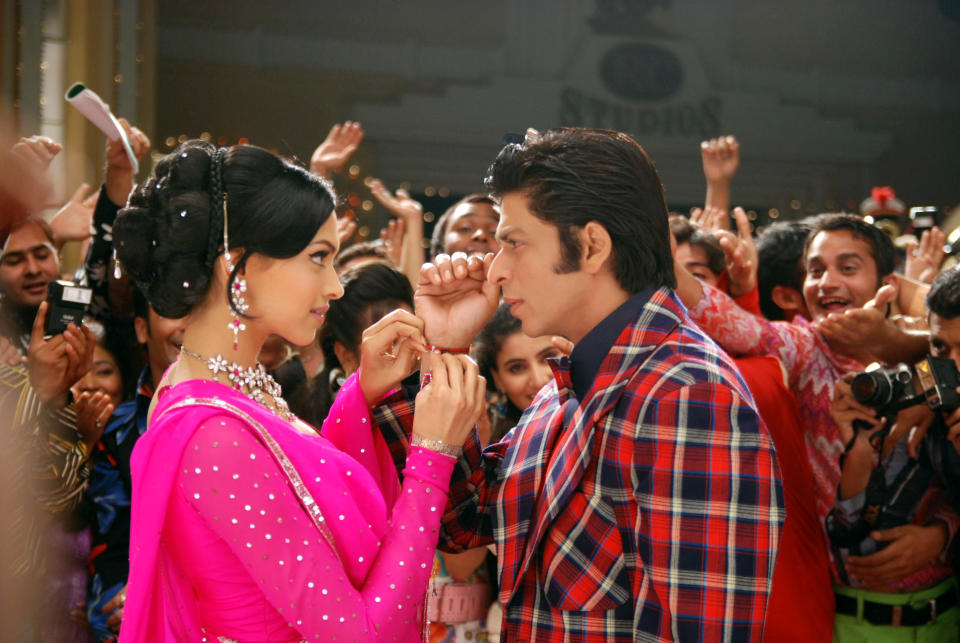Deepika Padukone On Bringing Indian Cinema To Hollywood, Tackling Mental Health Taboos And Helping Underrepresented Communities
- Oops!Something went wrong.Please try again later.
- Oops!Something went wrong.Please try again later.
- Oops!Something went wrong.Please try again later.
- Oops!Something went wrong.Please try again later.
- Oops!Something went wrong.Please try again later.

For two years in a row, Deepika Padukone has kickstarted India’s box office with a bang: In 2023, the acclaimed actor and producer reunited with her Om Shanti Om co-star Shah Rukh Khan for espionage actioner Pathaan, which went on to take $76 million in India and crossed the $100 million global box office milestone without a China release. This year Padukone starred in Viacom/Marflix’s Hindi aviation actioner Fighter (from Pathaan director Siddharth Anand), which grossed $43 million globally in just 30 days.
“Of course, the success of a movie is important, and box office is important, and the awards and accolades are important, but for me, as a person, the time I’ve had with people and the experiences I have on the set of a film are the most important,” Padukone says.
More from Deadline
The former Cannes jury member, who is now one of India’s biggest female stars, first broke into the Hindi cinema scene in 2007 with blockbuster hit Om Shanti Om opposite Bollywood legend Khan. The film is largely considered one of the country’s most classic titles, and when its director, Farah Khan, cast unknown model and former badminton athlete Padukone (Deepika’s father is Indian world champion player Prakash Padukone) as its leading lady without even auditioning her, it quickly catapulted her to star status.

“It was sort of unheard of,” says Padukone of the experience. “I remember thinking, ‘Why would they put so much money into such a big movie for such a big superstar and then cast me opposite without even an audition?’” But, according to Farah Khan, she saw something in Padukone that had yet been undiscovered — a unique mix of the old and modern world of Indian cinema.
“When I think back, I think of myself as so young and naïve and lost but at the same time, I felt so protected and I really couldn’t have asked for a better debut, because they protected me and they didn’t need to,” says Padukone. “They made sure that I emoted well and that I said my dialogue well, and made me feel included and comfortable. And then when we started promoting the movie, they really propped me up and put me out there and my life changed overnight.”
Since then, Padukone has starred in a raft of hit films such as romantic comedies Cocktail, Yeh Jawaani Hai Deewani, and Chennai Express, as well as heist comedy Happy New Year and period dramas Bajirao Mastani and Padmaavat. There’s also 2015’s Piku, for which she won two Filmfare Awards for Best Actress. This year, she has Kalki 2829 AD set to release in May, which also stars Telugu actor Prabhas, an epic sci-fi film that she describes as “part mythology set in a post-apocalyptic world” and she is currently filming Singham Again, the third installment of Rohit Shetty’s Singham series, which also stars Padukone’s husband Ranveer Singh.
Later this year, she’s slated to star in a Bollywood remake of the 2015 Robert De Niro and Anne Hathaway film The Intern, which Padukone will also produce via her Ka Productions banner. It will be the second project from the production company after 2020’s Chhapaak, in which Padukone played acid attack survivor Laxmi Agarwal.

Padukone is one of the few Bollywood actors who have managed to break into Hollywood having made her English-language debut in 2017’s xXx: Return of Xander Cage with Vin Diesel. “About a decade ago, when I started my journey in the West auditioning, it was a really new process for me because I’d never had to audition. I wasn’t a trained actor, and I never went to a fancy acting school — everything that I’ve learned has been on the job.”
Auditioning in Hollywood was, admits Padukone, a challenging experience — “the systems are so different between Hollywood and Bollywood” — but she’s encouraged by how much the global film world has changed since she starred in XXX. She points to the success of Indian title RRR — which made Oscar history when it won Best Original Song in 2023 for “Naatu Naatu” — as a boon for Indian cinema exports. “I think the world has become smaller, and the world has come together and it’s really about telling great stories,” she says. “Whether it’s working in Sweden or Bosnia, it’s about telling interesting stories that resonate for an audience across the world.”
She adds, “I don’t think we’ve drastically changed anything in India about the way that we work or the kinds of stories that we tell. I think we’ve always had interesting stories to tell, but I do think that what has changed is that the world has opened up to the idea of the East and to India in particular and I think that’s the change — realizing there is a world outside of America.”

Beyond the world of entertainment, Padukone has long been a staunch advocate for mental health awareness and has often spoken publicly about her struggle with depression. In 2015, she revealed her battle with depression and anxiety in a candid interview with India’s NDTV, a subject that was still receiving stigma in the sub-continent. Since then, she set up the Live Love Laugh foundation, a non-profit organization that aims to raise awareness about stress, anxiety, depression and mental health in India while focusing on accessibility and affordability in rural India as well as corporate mental health.
“It really began with my personal journey about a decade ago and when I went through my own experience with anxiety and depression, I just remember that everything was so taboo and hush-hush and it made me wonder why we went about it like that,” she says. “That’s what’s really prompted me to come out and speak about my own experience and normalize it.
Best of Deadline
2024-25 Awards Season Calendar - Dates For Oscars, Tonys, Guilds, BAFTAs, Spirits & More
2024 Premiere Dates For New & Returning Series On Broadcast, Cable & Streaming
Sign up for Deadline's Newsletter. For the latest news, follow us on Facebook, Twitter, and Instagram.

